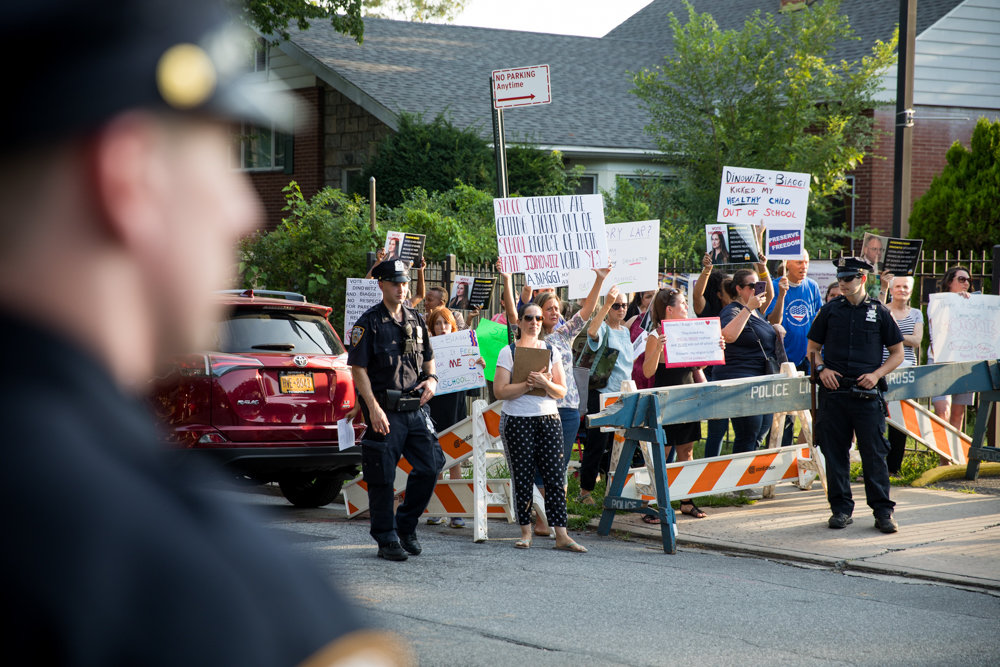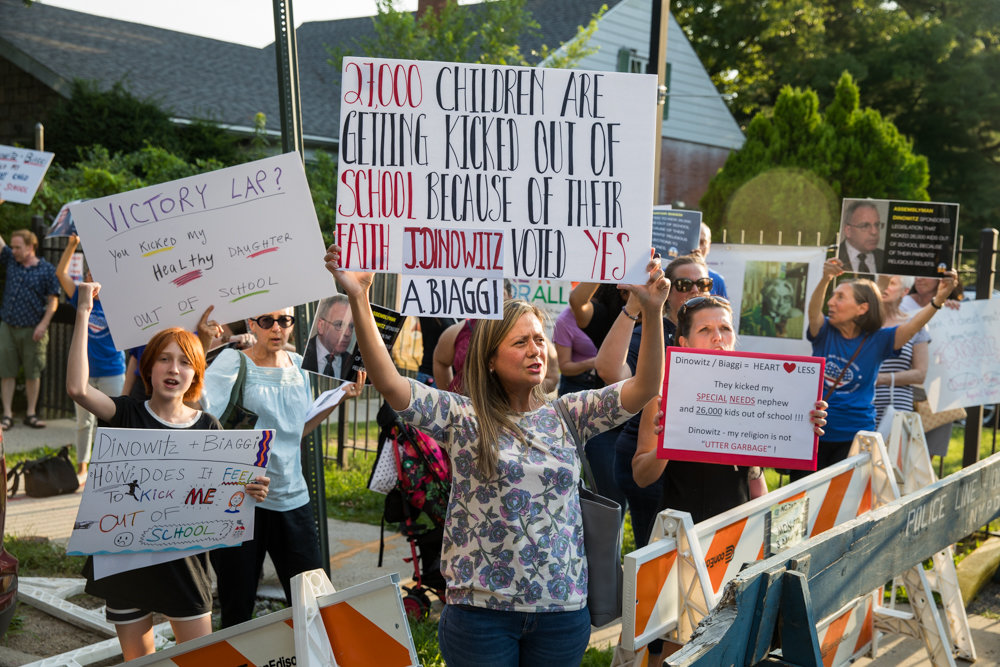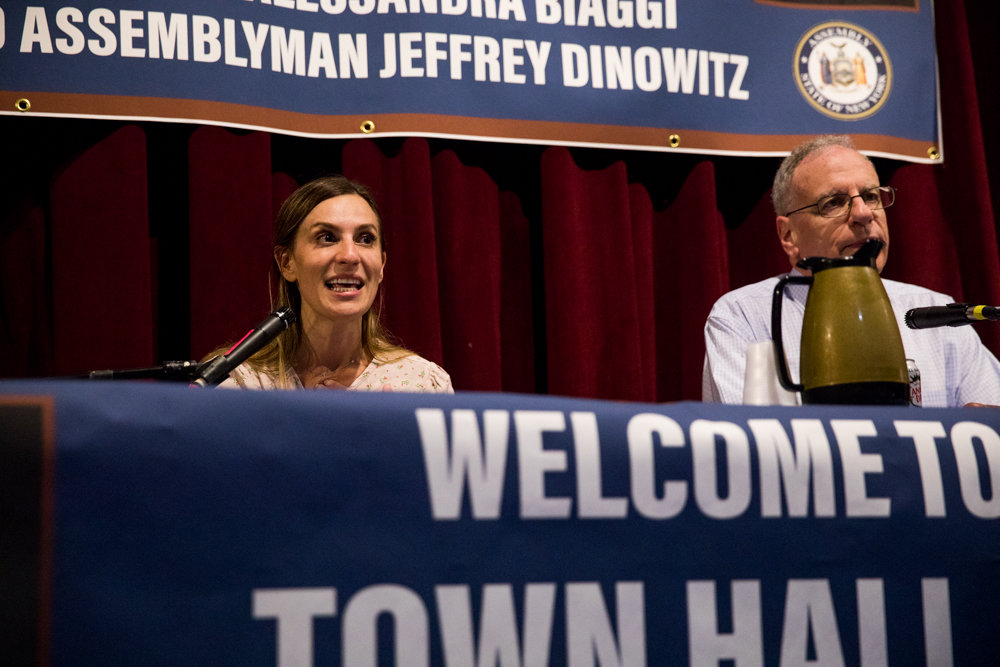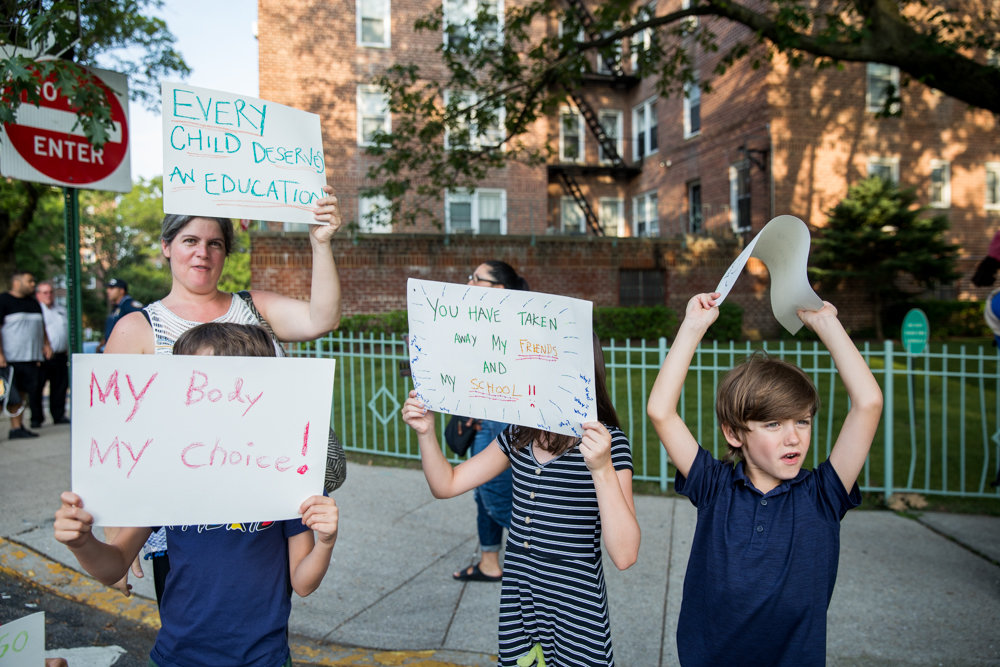Lawmakers highlight busy Albany session despite anti-vaxx protests
For state Sen. Alessandra Biaggi, it was her first completed session. For Assemblyman Jeffrey Dinowitz, well, he’s probably lost count.
Yet both lawmakers returned home from Albany last month triumphant in the bills they introduced and sponsored in the senate and Assembly, but would only share that jubilation with those who showed up for a town hall at The Riverdale Y last week, and who could prove they lived within their districts.
That left a number of people out in The Y’s parking lot, including about 40 anti-vaccination protesters holding signs behind police barricades chanting, “Dinowitz is corrupt.” Officers with the 50th Precinct ushered people across Arlington Avenue amidst the protest, attacking Dinowitz for his vocal support of removing religious exemptions from required vaccines.
Inside the muggy room, both lawmakers talked about some of their major wins in Albany. Biaggi fought for bills addressing equal pay, child abuse reporting and driver’s licenses for undocumented immigrants. Dinowitz supported tenant protection and election reforms.
Both legislators talked about the “historic” session that saw a flurry of bills designed to protect kids, prevent homelessness, and fight President Donald Trump’s federal agenda in Washington. The Democratic majority in both chambers passed bills about sexual harassment, congestion pricing, and college financial aid to the children of undocumented immigrants, to name a few.
Perhaps most striking was the camaraderie between Dinowitz and Biaggi — whom Dinowitz snubbed in last year’s primary by endorsing her opponent, incumbent Jeffrey Klein. Biaggi spoke about how cooperation between their staff members got bills passed.
“Probably many of you are thinking, ‘I’m surprised that you worked together,’ but we did in a very amazing way,” Biaggi said. “And honestly, we were able to deliver incredible things truly for this district and the state of New York.”
Audience members asked what state lawmakers did to address the federal government’s agenda and “the racist actions of the current president.”
The Assembly changed the law allowing the state to prosecute state crimes, even if Trump has pardoned the federal versions of those same crimes, Biaggi said. Another bill will allow the state to provide congressional committees tax records upon request, including the state returns of Trump.
When the senate debated bills strengthening the rights of undocumented immigrants, Biaggi said she heard “rhetoric coming from the other side of the aisle” referencing those immigrants as “illegals.” Biaggi talked about how she suppressed the impulse to call the comments racist.
“I shared what so many of the individuals on the other side of the aisle must have forgotten, that not only are we all immigrants — unless … we originated from North America — but not that long ago, Italians and Irish were ‘the other,’” Biaggi said.
The senator co-sponsored what she described as an ambitious bill to provide single-payer health care to all state residents. Although there’s a lot of support for the bill, debate began too late this session, and there wasn’t enough time to corral the votes needed to pass it, Biaggi said. But there’s always next session.
“If the economics are sufficient, if we have gotten enough testimony and had enough hearings that satisfy the questions that are still open for some, I think we can see it,” she said.
On the education front, Dinowitz says the annual statewide standardized regents exam shouldn’t be used to evaluate teacher performance. The test does, however, have merit.
“We spend a lot of time preparing kids for standardized tests that are given in schools,” Dinowitz said, “but for those who say we shouldn’t test kids, sorry, I don’t agree with that.”
Concerning student loans, Biaggi admitted she has more than $200,000 in debt from law school that carries an 8 percent interest rate. That, Dinowitz said, needs to be addressed.
“If you have a mortgage on a house and you have an 8 percent mortgage, you can refinance that mortgage at a lower rate,” the Assemblyman said. “But if you have a student loan, apparently you can’t do that. That’s really outrageous.”
One question called attention to the Assembly’s passage of mandatory paid vacation, which some consider another burden added to small businesses that already struggle to stay open.
But it’s not paid vacation, however, that’s burdening businesses, Dinowitz said, but rent. Astronomical commercial rent is forcing even high-end retail stores to close. When businesses leave, landlords often exploit a loophole allowing them to keep stores empty that they write off as a loss.
Commercial rent reform is “absolutely something the state can do to combat this,” Biaggi said.
Some new laws have placed a burden on small businesses however, according to Dinowitz, but he doesn’t regret passing a minimum wage increase and paid family leave.
“Does that add to the cost for business owners? Of course it does,” he said. “But what really comes down to it, that’s not the real culprit here. It’s the landlords.”
Both Dinowitz and Biaggi support legalizing marijuana and expunging certain criminal records. There are better ways to focus law enforcement’s time, Dinowitz said. Changing the law won’t encourage more people to partake because “the people who want to smoke already smoke.”
Plus laws against cannabis are not always equally enforced in certain communities, Dinowitz said, leading to a disproportionate number of minorities charged with minor marijuana possession.
The legislature passed five bills addressing the opioid epidemic, Biaggi said. Legislation will require medical examiners to state which specific opioid caused an overdose death. Prison inmates will be treated for addictions. The state will require Medicaid to cover specific treatment for opioid addiction.
Another bill directed the state Office of Alcoholism and Substance Abuse Services to report its initiatives and projects to address opioid abuse. Legislation also began an outreach program educating the public about opioid antagonists, first aid and good Samaritan laws that protect people aiding someone who has overdosed.
The legislators fielded questions about mass transit (the bus redesign is long overdue), the Jerome Park Reservoir (the northern basin shouldn’t be left dry), and climate change (the United States needs to take immediate action to address it.)
And on the subject of getting more people to vote, both said schools should teach civics, why the public’s voice matters, and how state politics has more effect on their daily lives than federal laws.
“So many of us in this room are here because we’re privileged to be in this room,” Biaggi said, “because we grew up in families that encouraged us to speak up or vote, or to appreciate democracy.”
The key to getting more people to the polls is by showing them they can change their government for the better.
“It’s just a matter of people being interested,” Dinowitz said. “We have to do everything we can to get people interested and encourage people to vote.”















